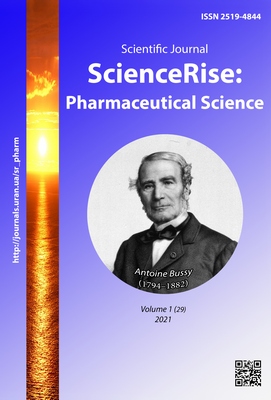Research of gender features of pharmacists
DOI:
https://doi.org/10.15587/2519-4852.2021.225769Keywords:
pharmacy, gender features, socio-psychological characteristics, pharmacist, locus of control, volitional qualities, interpersonal relations, resistance to conflicts, masculinity-femininity, personal orientationAbstract
The aim of the study is to determine the gender characteristics of pharmacists.
Materials and methods. To study gender characteristics, a survey of pharmacy specialists was conducted using a specially designed questionnaire and psychological methods: “Locus of control” (J. Rotter test modified by O. Ksenofontova), study of volitional personality qualities (questionnaire of N. Stambulova); Cattell test 16 PF; diagnostics of interpersonal relations (T. Leary test in modification by L. Sobchyk), express diagnostics of resistance to conflicts, methods of studying personality orientation (test of V. Smekal and M. Kucher).
Results. The relevance of the study of gender characteristics of pharmacists is substantiated. The level of involvement of women in management in the economy, politics, education, in law enforcement and health authorities in Ukraine has been analyzed, which indicates gender identity. The essence of gender analysis according to specifics of pharmacy is determined. The manifestations of masculinity-femininity in pharmacists have been studied. The level of subjective control of pharmacists is analyzed. Characteristic features of men and women pharmacists are estimated. The volitional qualities of pharmacists have been studied. Conflict resistance was diagnosed. The types of interaction between men and women pharmacists are studied.
Conclusions. It has been proven that women pharmacists are feminine and prone to gender stereotypes. Male pharmacists have a low level of subjective control and do not associate actions with subsequent events, as well as show themselves as independent, determined, courageous, purposeful, proactive, persistent professionals with endurance and self-control. It was found that both women pharmacists and men pharmacists show an average level of conflict resistance. The personal orientation is revealed, so at men-pharmacists motives of own well-being and aspiration to prestige prevail
References
- Pro zabezpechennia rivnykh prav ta mozhlyvostei zhinok i cholovikiv (2005). Zakon Ukrainy No. 2866-IV. 08.09.2005. Vidomosti Verkhovnoi Rady Ukrainy, 52, 561.
- Global Gender Gap Report 2020 (2020). Available at: http://www3.weforum.org/docs/WEF_GGGR_2020.pdf
- Raigorodskii, D. (2001). Prakticheskaia psikhodiagnostika. Metody i testy. Moscow: Bakhrakh-M, 672.
- Romanova, E. S. (2011). 147 populiarnykh professii: professionalnii analiz i professiogrammy. Moscow: AspektPress, 416.
- Teong, W. W., Ng, Y. K., Paraidathathu, T., Chong, W. W. (2019). Job satisfaction and stress levels among community pharmacists in Malaysia. Journal of Pharmacy Practice and Research, 49 (1), 9–17. doi: http://doi.org/10.1002/jppr.1444
- Hanna, L.-A., Wilson, M., Hall, M., Hanna, A. (2018). A Questionnaire Study to Investigate Stress among Future Pharmacists by Gender and Year Group. Pharmacy, 6 (3), 75. doi: http://doi.org/10.3390/pharmacy6030075
- Tanner, J., Cockerill, R., Barnsley, J., Williams, A. P. (1999). Gender and income in pharmacy: human capital and gender stratification theories revisited. The British Journal of Sociology, 50 (1), 97–117. doi: http://doi.org/10.1111/j.1468-4446.1999.00097.x
- Alomi, Y. A., Rph, F. A. B., Alsubaie, R. S., Alghuraybi, B. I., Aloumi, B. E. (2019). Factors (gender, age, social status, and income) affecting the satisfaction of pharmacy career in Saudi Arabia. Pharmacology, Toxicology and Biomedical Reports, 5 (2), 88–92. doi: http://doi.org/10.5530/ptb.2019.5.16
- Carvajal, M. J., Popovici, I. (2018). Gender, age, and pharmacists’ job satisfaction. Pharmacy Practice, 16 (4), 1396. doi: http://doi.org/10.18549/pharmpract.2018.04.1396
- Manolakis, M. L., Olin, J. L., Thornton, P. L., Dolder, C. R., Hanrahan, C. (2011). A Module on Death and Dying to Develop Empathy in Student Pharmacists. American Journal of Pharmaceutical Education, 75 (4), 71. doi: http://doi.org/10.5688/ajpe75471
- Carvajal, M. J., Deziel, L., Armayor, G. M. (2012). Labor supply functions of working male and female pharmacists: In search of the backward bend. Research in Social and Administrative Pharmacy, 8 (6), 552–566. doi: http://doi.org/10.1016/j.sapharm.2012.01.006
- Carvajal, M. J., Popovici, I., Hardigan, P. C. (2018). Gender differences in the measurement of pharmacists’ job satisfaction. Human Resources for Health, 16 (1). doi: http://doi.org/10.1186/s12960-018-0297-5
- Atemasova, O. A. (2010). Praktychna psykholohiia. Kharkiv: Ranok, 160.
- Altunyna, I. R., Nemova, R.S. (2011). Sotsialna psykholohiia. Moscow: Yurait, 427.
- Malik, M., Qureshi, A., Hussain, A. (2019). Personality traits of pharmacists: a better understanding of factors influencing pharmacy practice change in Pakistan? Indo American Journal of Pharmaceutical Research, 8, 1466–1473.
- Carvajal, M. J., Popovici, I., Hardigan, P. C. (2019). Gender and Age Variations in Pharmacists’ Job Satisfaction in the United States. Pharmacy, 7 (2), 46. doi: http://doi.org/10.3390/pharmacy7020046
- Sahaidak-Nikitiuk, R. V., Harkusha, M. I. (2016). Metodolohichne obgruntuvannia systemy sotsialno-psykholohichnykh kompetentnostei profesiinoi diialnosti fakhivtsia farmatsii. Sotsialna farmatsiia v okhoroni zdorovia, 17, 44–51.
- Sahaidak-Nikitiuk, R. V., Harkusha, M. I., Alokhina, N. V. (2018). Metodyka provedennia psykholohichnoho testuvannia dlia otsinky rivniv rozvytku profesiino vazhlyvykh sotsialno-psykholohichnykh kharakterystyk fakhivtsia farmatsii. Kharkiv: NFaU, 44.
- Chudakova, V. P. (2015). Vykorystannia opytuvalnyka R. Kettella u doslidzhenni «indyvidualno-psykholohichnykh osoblyvostei osobystosti» − kryteriia sformovanosti psykholohichnoi hotovnosti do innovatsiinoi diialnosti y konkurentozdatnosti osobystosti. Osvita ta rozvytok obdarovanoi osobystosti, 2 (45), 40–47.
- Ilin, E. P. (2010). Pol i hender. Saint Petersburg: Piter, 1250.
- Muslimova, N. N., Garifullina, G. Kh. (2013). Opredelenie professionalnogo prizvaniia, priverzhennosti svoei pofessii i udovletvorennost trudom u provizorov v khode obucheniia na sertifikatsionnykh tsiklakh. Nauka i obrazovanie XXI veka. Ufa: RITS BashGU, 3, 108–111.
Downloads
Published
How to Cite
Issue
Section
License
Copyright (c) 2021 Рита Васильевна Сагайдак-Никитюк , Елена Вадимовна Козырева , Наталия Викторовна Алехина , Наталья Владимировна Демченко , Мария Владимировна Заричковая , Диана Романовна Зоидзе

This work is licensed under a Creative Commons Attribution 4.0 International License.
Our journal abides by the Creative Commons CC BY copyright rights and permissions for open access journals.







